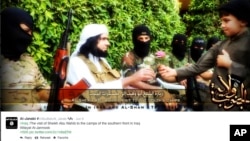The militant group that calls itself the Islamic State (IS) has proved adept at radicalizing young Muslims, and Western countries, including the U.S., are finding that history and long-held beliefs in the Middle East put them at a disadvantage when countering IS’s recruitment efforts.
A popular IS propaganda message is that the West in general and the United States in particular are at war with Islam. They also promote a narrative that Western interference is largely responsible for the historic grievances of the Islamic world.
Omer Taspinar, a senior fellow at the Brookings Institution said the collective memory of most Arab states is based on a sense of being victimized by a conspiracy of external powers.
“Victimhood is very convenient because it allows you to escape responsibility and accountability. Since you are never guilty, someone else has to be at fault for causing all the problems,” said Taspinar. “You unleash the media and blame the West on the grounds that they are racist, orientalist, imperialist, etc. and as a result, the citizenry of these states believe their destiny is not in their hands.”
Adel Iskandar, Assistant Professor of Global Media at Simon Fraser University in Vancouver pointed out that most of the state borders in the region were drawn by colonial powers. He said the role played by the West in the region left deep scars in the national psyche.
Iskandar said the militants’ message about the West being at war with Islam must be shown as false, but it can’t be the U.S. presenting a counter narrative critical of the IS interpretation of Islamic teaching.
“It has to be a concerted effort by Muslims against ISIS rather than the U.S., which is perceived as a Judeo-Christian society by ISIS,” he said.
While religious authority figures in the Muslim world and Islamic associations in the West have condemned IS ideology as ‘hateful’, Iskandar said IS was quick to dismiss them, saying they either did not conform to Islamic teachings or they had been compromised by western societies and ideologies.
“It is not just about condemnation, it is more about revisiting the scriptures themselves to see where and how these interpretations have been misused by ISIS,” he said.
Former Assistant Secretary of State for Public Affairs Philip Crowley said that alternative interpretation must be handed down community by community.
Over time, he believes that more personal approach will help persuade average people that what IS describes is just a mirage.
Crowley also admitted that what he calls the “U.S. credibility problem in the Middle East” plays into the hands of those trying to radicalize young Muslims.
“We have to narrow the gap between what we are perceived to say and what we are perceived to do,” the former U.S. diplomat said.
Iskandar agrees and said IS wins followers by telling impressionable young people that they are helping to confront American imperialism.
“The most convincing way to deliver a real blow not only to conspiracy theories but also to those who claim that the U.S. is on the wrong side of history in the Middle East is to basically talk the talk and walk the walk,” Iskandar added.
“We need to get our policy right, defeat ISIS, continue to make progress on the Arab-Israeli front, find ways to stabilize the situation in the region and produce effective and real politics into these countries,” Crowley said.




